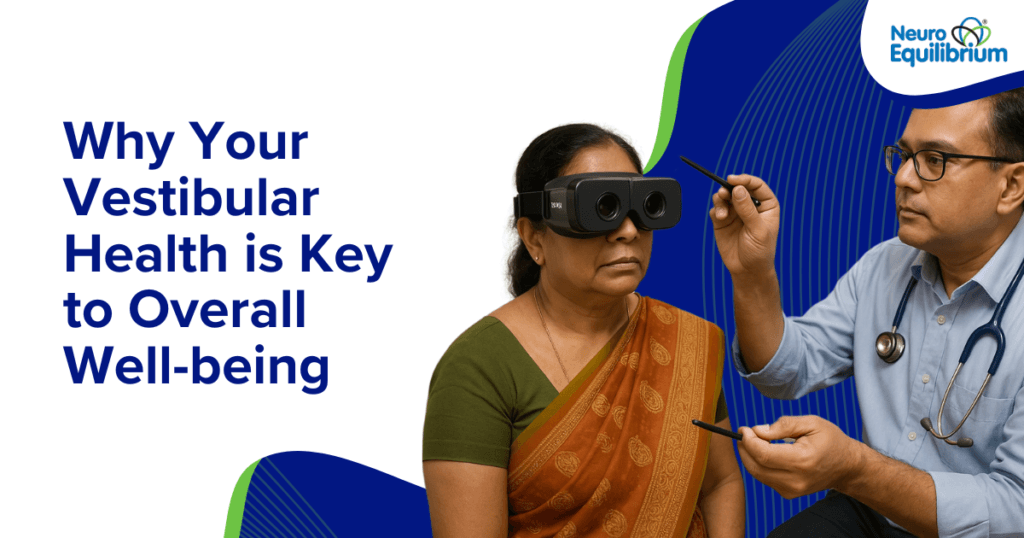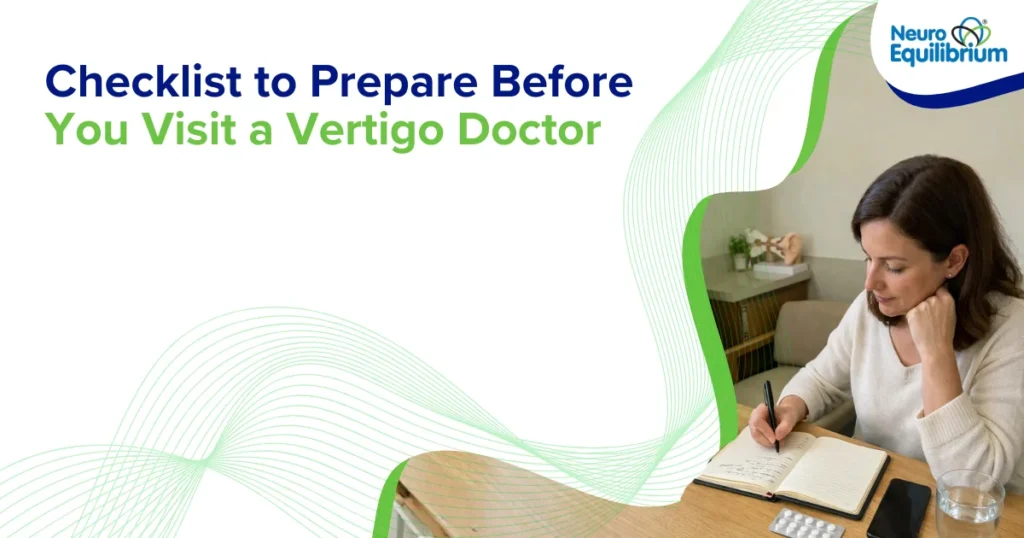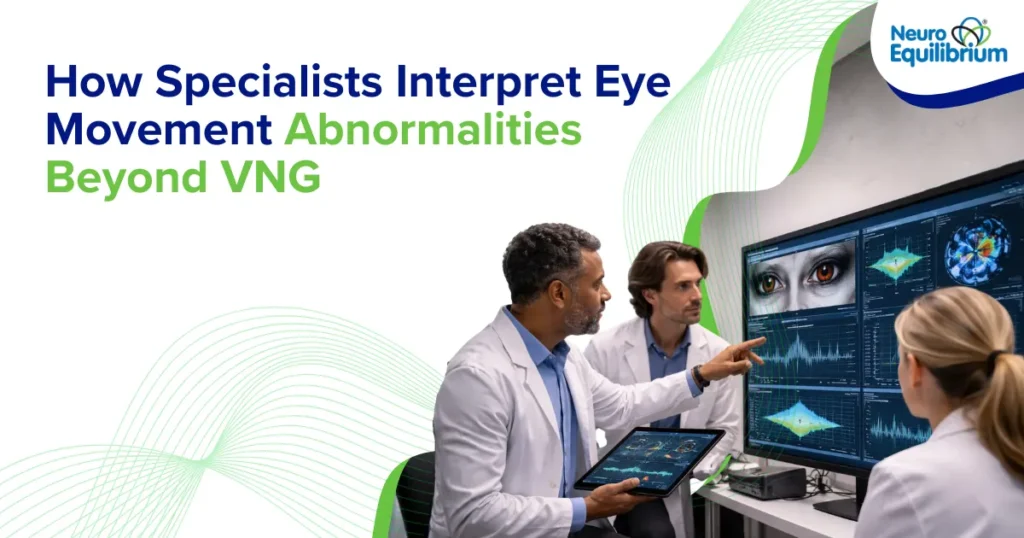World Health Day is celebrated every year on April 7th to raise awareness about important health issues and encourage people to take proactive steps toward better health. Established by the World Health Organization (WHO) in 1950, this day serves as a reminder of the importance of global health and the need for everyone to have access to quality healthcare, regardless of their location or background.
While physical fitness, mental health, and nutrition often dominate health conversations, balance and vestibular health remain largely overlooked despite being essential for overall well being. The vestibular system, located in the inner ear, plays a crucial role in maintaining balance, coordinating movements, and providing the brain with information about body position and motion. When this system is not functioning properly, it can lead to issues like dizziness, vertigo, unsteadiness, and falls, which can significantly affect daily life and mental health.
Know More About Vestibular Health
- NeuroEquilibrium Vestibular Assessment Platform
- Vestibular Rehabilitation Exercises & Therapy
- Vestibular Neuritis
For many people, poor balance or frequent dizziness may seem like minor inconveniences rather than serious health problems. However, balance issues can lead to a loss of independence, increased risk of injury, and even mental health challenges such as anxiety and depression. Addressing vestibular health is not just about improving balance, it’s about enhancing overall quality of life and reducing the physical and psychological toll that vestibular disorders can cause.
On World Health Day, it’s important to recognize that vestibular health is key to maintaining physical stability, cognitive clarity, and mental resilience. By understanding the role of the vestibular system and taking steps to improve balance health, individuals can reduce their risk of injury, enhance daily functioning, and support long term well being.
Understanding Vestibular Health
The vestibular system is a part of your inner ear that acts like a built-in sensor. This tells your brain when you are moving, tilting, or standing still. This system helps you stay balanced while walking or standing, allowing you to move smoothly without feeling unsteady. It also helps your head and eyes work together, so you can focus on objects even when moving. Simple tasks like walking in a straight line or standing up quickly without a well-functioning vestibular system could make you feel dizzy or off balance.
Why Vestibular Health is Crucial for Overall Well-being
Good vestibular health is essential because it affects many parts of your life. From a physical health perspective, poor balance increases the risk of falls and injuries, especially as you get older. Mentally, chronic dizziness or vertigo can lead to feelings of anxiety and stress because you constantly feel unsure of your footing. It can also affect your cognitive function, making it harder to concentrate or think clearly. On a day-to-day level, vestibular issues can make simple activities like driving, walking, or even standing still feel difficult, which can lower your confidence and independence. Taking care of your vestibular health helps you feel more stable and in control of your body.
Common Signs of Poor Vestibular Health
Your body sends warning signals when your vestibular system isn’t functioning properly. Dizziness and lightheadedness are common symptoms of vestibular dysfunction. These sensations can be triggered by actions like standing up too quickly — or, in some cases, they may occur even while sitting still. It can feel as if the room is spinning — a classic sign of vertigo..
Another sign of poor vestibular health is having trouble walking or feeling unsteady when you move. You might struggle to keep your balance, especially when walking on uneven ground or turning quickly. Some people feel like they might fall over even when they are standing still.
When your vestibular system suffers from poor health, it negatively impacts your vision. The inability to focus properly during movement, such as reading street signs, could indicate that your vestibular system fails to communicate properly with your eyes. Your vision becomes hazy and unsteady, so you struggle to follow objects in your field of view. As a result, multi-tasking in general becomes difficult.
An impaired sense of balance also increases the likelihood of a fall. The function of your vestibular system can be compromised if you experience stumbling incidents combined with a sense of foot unsteadiness. Each daily activity, including standing, walking, and sitting, requires proper balance; therefore, you must monitor persistent balance issues until you receive medical assistance.
Protect Your Vestibular Health
Supporting your vestibular system through daily care can significantly improve your balance and reduce symptoms like dizziness or unsteadiness. NeuroEquilibrium offers customized vestibular rehabilitation exercises through our online app, developed by experts to suit each individual’s condition and recovery pace. These targeted exercises are designed to retrain your brain’s response to motion and enhance balance over time.
Our platform connects you with trained physiotherapists who guide you through these exercises remotely and track your progress. In addition to physical rehab, we understand the mental toll that vestibular disorders can take. That’s why NeuroEquilibrium also offers online cognitive behavioral therapy (CBT) to help manage stress, we anxiety, and the emotional impact of chronic dizziness or vertigo.
Improving body awareness through movement is key to balance recovery. While guided rehab is essential, simple daily exercises like standing on one foot or heel-to-toe walking can serve as helpful additions. Complementary practices like yoga and tai chi can also support your progress — their slow, mindful movements help strengthen postural muscles and improve coordination. These should be done alongside, not in place of, your personalized vestibular therapy.
Lifestyle choices also play a major role. Staying well-hydrated helps maintain proper fluid levels in your inner ear, which are critical for accurate balance signaling. A balanced diet rich in potassium (from foods like bananas and spinach) and magnesium (found in leafy greens and nuts) supports both inner ear and nervous system function. Reducing salt and caffeine is recommended, as these can worsen dizziness by disrupting fluid balance.
Stress is a common trigger for vestibular symptoms, including migraines and motion sensitivity. NeuroEquilibrium’s online counseling can guide you through effective stress-relief strategies — from mindfulness and deep breathing to behavioral therapy. Managing stress helps your nervous system stay calm and responsive, improving your body’s balance control.
Quality sleep is equally important. Your brain and inner ear rely on rest to process balance-related signals. To reduce daytime dizziness, aim for 7–8 hours of sleep, follow a regular sleep routine, and avoid screens before bedtime.
Finally, regular medical check-ups are vital. If you’re experiencing ongoing dizziness, imbalance, or vertigo, connect with a NeuroEquilibrium vestibular specialist through our platform. Early diagnosis and personalized treatment can significantly speed up recovery and help you regain confidence in your movements.
By combining expert-led digital rehab, mental health support, and balanced lifestyle habits — along with complementary practices like yoga and tai chi — you can take full control of your vestibular health and improve your overall quality of life.
When to Seek Help
- You should check with a vestibular specialist whenever any severe symptoms develop or make it difficult to carry out everyday activities. Seeking help at an early stage improves treatment success and allows you to mend both your balance and stabilize yourself.
- Seek medical help when vertigo onset disrupts your ability to walk, drive, and function normally, even during basic activities such as getting out of bed. The discomfort of vertigo creates an elevated danger of both falls and injuries. The inability to carry out regular activities indicates a problem with your vestibular system.
- The evaluation requires attention when balance problems co-occur with hearing problems. The ear conditions Ménière’s disease and labyrinthitis produce sudden hearing problems with tinnitus and ear pressure, resulting in dizziness. Nausea and severe headaches combined with balance problems require medical evaluation because they may be signs of either a vestibular migraine or a neurological condition. The early discovery of what causes these issues helps stop additional adverse effects from occurring.
Visit a vestibular specialist whenever your symptoms start affecting your life functions or become significantly worse. Obtaining help from the beginning of your condition will enable better treatment performance while allowing you to regain control of your balance and stability.
Conclusion: Take Charge of Your Vestibular Health
The condition of your vestibular system directly affects your overall health state. Having a properly operating vestibular system enables physical steadiness as well as mental clarity and movement confidence. Early intervention for balance problems will both enhance your life quality and stop future complications from occurring.
World Health Day serves as a reminder to address complete health needs, starting with physical, mental aspects and also stability maintenance. Vestibular health remains unstressed yet vitally contributes to everyday movements. Keeping your balance allows you to prevent injuries while you perform daily tasks with assurance and promotes total physical and mental wellness.
NeuroEquilibrium applies advanced technologies and expert care approaches for diagnosing and treating patients with vestibular disorders. Specialists at our chain of clinics work to understand the intricate nature of vestibular systems so they can develop individual treatment solutions for your stability and comfort needs.
Consult with our team as soon as you experience signs including dizziness together with vertigo and balance problems. Contact our team for consultation in order to begin your journey toward improved balance and renewed confidence.
Sources
- Dougherty J.M., Carney M., Hohman M., Emmady P.D. (2023). Vestibular Dysfunction. StatPearls. https://www.ncbi.nlm.nih.gov/books/NBK558926/ (NCBI)
- “Vestibular Balance Disorder.” Johns Hopkins Medicine. https://www.hopkinsmedicine.org/health/conditions-and-diseases/vestibular-balance-disorder (Hopkins Medicine)
- “Vestibular Disorders: Symptoms, Causes and Treatment.” Apollo Hospitals. https://www.apollohospitals.com/diseases-and-conditions/vestibular-disorders-symptoms-causes-and-treatment (Apollo Hospitals)
- “Vestibular health, often associated with balance and spatial orientation, plays an essential role in our cognitive well-being.” AVC Physio (2024). https://www.avcphysio.com.au/vestibular-health-and-mental-clarity/ (avcphysio.com.au)
- “Vestibular System.” Physio‑Pedia. https://www.physio-pedia.com/Vestibular_System (Physiopedia)
- “Living with a Vestibular Disorder.” Vestibular Disorders Association (VEDA). https://vestibular.org/article/coping-support/living-with-a-vestibular-disorder/ (Vestibular Disorders Association)
FAQs
Why is vestibular health important for overall well being?
The preservation of vestibular health remains essential since it supports three fundamental functions: balance and coordination together with spatial awareness. The condition of your vestibular system affects your ability to maintain balance which results in dizziness and causes both physical falls and mental cognitive problems.
Book a consultation at your nearest NeuroEquilibrium Clinic today.
What are the common signs of vestibular disorders?
Patients with this condition exhibit symptoms including dizziness alongside vertigo together with unsteadiness which makes it difficult to focus while moving and leads to numerous falls. A person who experiences ongoing symptoms needs to consult with a medical professional.
Book a consultation at your nearest NeuroEquilibrium Clinic today.
How can I improve my vestibular health?
To support vestibular function, people should practice yoga and tai chi exercises and maintain proper hydration, nutrition, stress management and quality sleep habits. Medical checkups which happen frequently enable the early identification of health problems.
Book a consultation at your nearest NeuroEquilibrium Clinic today.
When should I see a doctor for balance issues?
If you frequently experience dizziness, vertigo, difficulty walking, or hearing problems alongside balance issues, consult a vestibular specialist to identify the underlying cause and receive appropriate treatment.
Book a consultation at your nearest NeuroEquilibrium Clinic today.
How does World Health Day promote awareness of vestibular health?
World Health Day promotes awareness about multiple health problems while encouraging preventive care. The recognition of vestibular health during this year provides people with proactive measures to enhance their balance and stability.
Book a consultation at your nearest NeuroEquilibrium Clinic today.
















